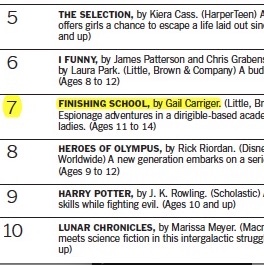Just as the title suggests, because agents are also human beings, they are going to embody both good and bad traits found in human nature. No one is perfect. And as some authors have discovered, some agents are more imperfect than others!
Your job as an author is to objectively recognize those human attributes or failings in your agent and decide whether they impact your career. Hopefully they don’t.
To this end, Karen Dionne of Backspace and I have put together a whole list of topics to tackle for “Because Agents Are Human Too.”
Topic 1: Because they are human, good agents keep their client lists small and manageable.
The trick is to define what is considered small and manageable. This question is asked at conferences all the time, and the truth is that the answer is going to vary widely depending on the agent and the agent’s situation.
Some things to keep in mind:
*Is the agent part of a larger organization/agency that supplies a lot of support staff in terms of auditing royalty statements, reviewing contracts, accounting, etc.? Or, if he or she is with a smaller, less corporate agency, how many non-agent personnel does the agency employ?
Many agencies employ a lot of agents but very few support staff. It’s typical in this industry that agents are one-man bands. They handle all the business elements listed above, and even if they’re associated with a larger agency, they still operate as the sole proprietors of their client lists. To be blunt, doing agenting well requires far more work than one person can handle in an eight- or ten-hour day—which means a lot of agents aren’t doing things like auditing royalty statements and thoroughly negotiating contracts.
More support staff = more clients an individual agent can manage successfully.
Here’s a good rule of thumb: If your agent has a lot of support in place, a larger client roster is not really a concern. If they don’t, then know that a larger client list is pretty difficult to manage, and more than likely, some business aspects are going to fall through the cracks.
Some possible red flags:
*Some agents operate on what we call the “shotgun” approach. They take on a bunch of clients, throw a lot of stuff out on submission, and see what sticks. These agents will have a lot of clients on their rosters.
*A high number of small- or no-advance deals could indicate that an agent is operating on the shotgun approach.
*Agents who are already established (five+ years as an agent) should have developed strong financial security with their current client roster. Be on the lookout for agents who suddenly take on a lot of clients all at once or during a short period of time. It could mean their current client list isn’t supporting their business.
*Be aware of agents who have high rate of client turnover, or who do a lot of one-time deals for authors but few subsequent deals.
For me, a small client list means fewer than 50 clients. My list is currently at 32.
Other agents may easily have a comfort level at 60 or 70 clients.
The real question here is, as an author, what is your comfort level regarding how many other clients your agent represents?








